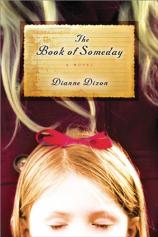Interview: September 13, 2013
Screenwriter Dianne Dixon is the author of the highly acclaimed THE LANGUAGE OF SECRETS and, most recently, THE BOOK OF SOMEDAY, which introduces readers to Livvi Gray, who has always been haunted by a terrifying nightmare of an eerily beautiful stranger in a shimmering silver dress. In this interview, Dixon answers questions from Bookreporter.com’s Sarah Rachel Egelman, including the very personal inspiration behind Livvi’s nightmare and the challenges of writing a novel from three different perspectives. She also opens up about why it seemed only natural to include faith and spirituality as central themes in her story, how penning a novel is different from writing a screenplay, and her very own “someday.”
Bookreporter.com: What was your inspiration or starting point for THE BOOK OF SOMEDAY? How did the idea evolve from there?
Dianne Dixon: One of the advance reviews for THE BOOK OF SOMEDAY said it was an intriguing mystery with an ending the reader never saw coming. And I really related to that comment. In a way, this entire book was something I never saw coming. The story is based on something I spent my life running away from, one of my deepest fears. A nightmare where I saw the image of a beautiful woman in a silver gown who was opening her mouth to let out a scream I knew would be the sound of absolute horror. That nightmare is one of my earliest childhood memories. When I was a little girl, the woman terrified me. I’d have given anything to make her go away. Then, when I was a teenager, I wanted to figure out who she was, but I was still afraid of getting too close to her (or whatever she represented). As an adult, I understood I needed to deal with her, to give her a context. And, being a writer, the only way I knew how to accomplish that was to tell her story. After I finally stopped labeling her as a monster and let myself see her simply as a woman --- one who, for some reason, had been silenced and was crying out to be heard --- that’s when the pieces of the story started to come together for THE BOOK OF SOMEDAY.
BRC: Your novel is very much about damaged family dynamics, especially between parents and children but also between spouses or partners. When you began writing, did you set out to explore these issues?
DD: I think what I wanted to explore were the things that cause the damage in family dynamics…things we all encounter as parents, and as children. The emotional weaknesses we struggle with. The secrets we keep. The hidden frailties that cause us to protect --- and betray --- the people we love in such unexpected ways.
BRC: Why did you decide to write the story from three perspectives (Livvi, Micah and AnnaLee)? Did it start with one character with the others evolving from there?
DD: Because the woman in the silver gown was a stranger, in a dream, and because I was essentially trying to explain a mystery, the perfect way to do it was to put the mystery at the heart of the book and have that mystery connect the three main characters. So, no, it didn’t start with one character and grow from there. Livvi, Micah and AnnaLee were all with me from the very beginning.
BRC: There are also several models of maternity and caregiving in the novel, from AnnaLee to Calista and others, some of whom are loving and wonderful, others of whom are nightmarish. Did you intend to examine women’s roles as mothers, or was that a by-product of other aspects of the plot?
DD: I don’t know if it was so much an examination of women’s roles as mothers, or if it was simply looking at the human beings who happen to be mothers, and seeing what a crapshoot it is for their kids. Some of us winning the lottery and being blessed with glorious mothers. Some of us getting mothers who are sort of okay. And some of us ending up with mothers who are just awful. And I guess what I wanted to celebrate is the strength of the human spirit --- that no matter how grim our childhoods may have been, we can choose to make our adult lives something truly wonderful.
BRC: Did you enjoy writing one of the characters more than the other two? And were any of the three character strands more difficult to write?
DD: I loved them all. In different ways. Each of their stories was a joy to write.
BRC: Livvi is a writer who recently came to public attention because of a very personal novel she wrote, and Micah is a photographer whose first important image is of someone very special to her. Do you think most art has an element of autobiography to it? Or can artists tell stories very different from what they know or have experienced themselves?
DD: I can’t speak for all writers, or all artists. But I suspect when a book, or any other form of art, really connects with its audience, it has to have been created with passion. And somewhere in that passion is a tiny part of the creator’s heart.
BRC: What was the most challenging aspect of writing this novel? What was the most satisfying?
DD: The most challenging aspect of writing THE BOOK OF SOMEDAY was keeping all three stories moving as separate narratives while also keeping them connected as parts of a cohesive novel.
The most satisfying aspect of writing this book has been the generous way it is being received by readers.
BRC: THE BOOK OF SOMEDAY is written in the present tense, which gives the novel a sense of immediacy. Why did you choose to write in the present tense, and was it difficult to maintain throughout your writing process?
DD: It really wasn’t a conscious decision to write the story in present tense. That was the way it began and the way it stayed. I think it was because I was experiencing a sense of immediacy as I was dealing with Livvi, Micah and AnnaLee. They felt like living, breathing people who wanted to be here, now, in the present.
BRC: There is a strand of, if not religious sentiment, spiritual sentiment running through the novel with a few key conversations, and one important character is even named Grace. Was spirituality or faith something you knew you wanted to include in your book, or did this come to the story as the characters developed?
DD: Spirituality and faith are just part of who I am, how I see life. And they’re also things that a lot of us wrestle with, and hope for, and question. So it seemed natural that Livvi, Micah and AnnaLee would be wrestling, and hoping, and questioning, right along with the rest of the world.
BRC: In addition to being a novelist, you are an accomplished screenwriter. How is writing a novel different from writing a screenplay?
DD: In a screenplay, you’re basically writing dialogue and laying down a blueprint from which other people --- the director, the actors, the editors --- will create the finished product. As a novelist, your job is to create every detail: the characters, their dialogue, their world, the clothes they wear, the music they listen to --- everything. And that requires a lot more work than writing a screenplay does.
BRC: Do you have a list of “somedays,” or things you want to accomplish or achieve in your life? If so, is there anything on that list you can share with readers?
DD: I’d love to be able, someday, to write an outstandingly good poem.
BRC: What are you working on now, and when might readers expect to see it?
DD: The manuscript I’m working on now is about twin sisters who share an oddly intertwined existence, which is blown apart by an act of violence committed by a stranger. Then, years later, a chilling clue to what caused that violence, an object so bizarre it’s heartstopping, is found in a suitcase hidden in the attic of a house that one of the sisters has only recently moved into. The question of how the suitcase got into that attic changes the sisters’ lives forever. And the answer, which is startling, is rooted in guilt and love, and a heartbreaking search for atonement. The book is set for publication in 2014.




